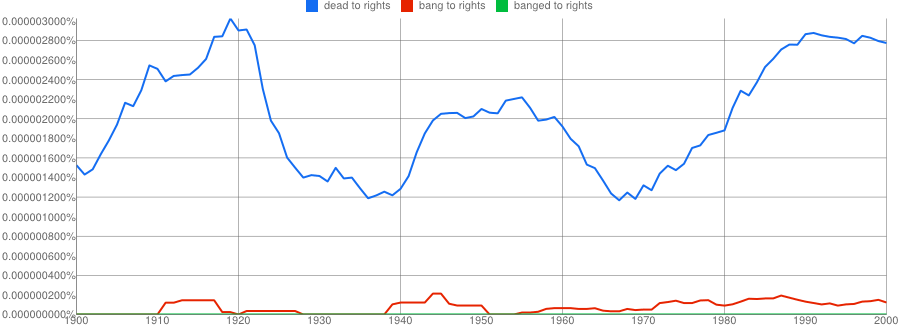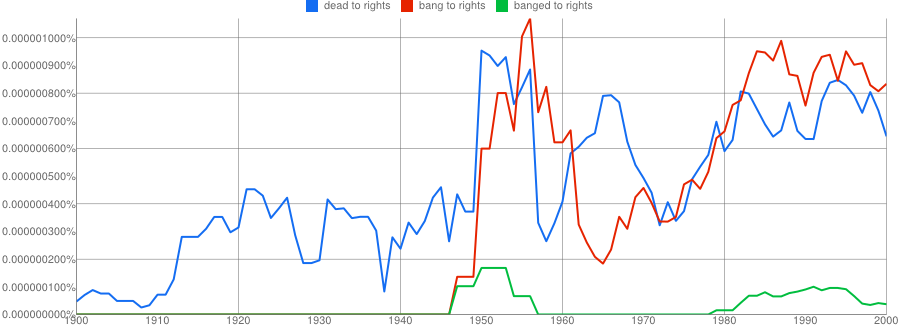I was watching a TV show and this term was used.
I am familiar with the definition, but I was wondering the origin of the phrase. It does not make sense to me if taken literally.
I was watching a TV show and this term was used.
I am familiar with the definition, but I was wondering the origin of the phrase. It does not make sense to me if taken literally.
W.S. Farmer & J.L. Henley, Slang and Its Analogues, vol. 2 (1891), says that "dead to rights" means "certain; without doubt," and asserts that it is simply an amplification of the earlier term "to rights," meaning "completely to one's satisfaction." Dead appears in a similarly amplifying way in such current phrases as "dead broke," "dead certainty," "dead heat," and "dead ringer."
Christine Ammer, The American Heritage Dictionary of Idioms (1997) gives a sense of how much the meaning of the phrase has evolved:
dead to rights In the act of committing an error or crime, red-handed. For example, They caught the burglars dead to rights with the Oriental rugs. This phrase uses to rights in the sense of "at once."
Harold Wentworth & Stuart Flexner, Dictionary of American Slang, first edition (1960) gives both meanings:
dead to rights 1 Certain. c1880. Colloq. 1939: "You've got him dead to rights...' Gardner, D. A. Draws, 185. 2 Caught in the act of or irrefutably accused of an illegal, immoral, unethical, or antisocial act.
But the Robert Chapman & Barbara Kipfer, Dictionary of American Slang, third edition (1995) agrees with Ammer's narrower definition:
dead (or bang) to rights adv phr by 1859 With no possibility of escape or evasion; in flagrante delicto; red-handed: ...was caught "dead to rights" and now languishes in the city Bastille—San Francisco City Argus
UPDATE (9/17/2013): I did some checking in Google Books search results and found a source that probably explains Chapman & Kipfer's "by 1859" dating. George Matsell, Vocabulum; or, The Rogue's Lexicon (1859), contains this entry:
DEAD TO RIGHTS. Positively guilty, and no way of getting clear.
To like effect is a glossary entry in George Burnham, Memoirs of the United States Secret Service (1872):
DEAD TO RIGHTS, caught, with positive proof of guilt.
So it appears that Farmer & Henley didn't fully grasp the sense of "dead to rights" as the phrase was used in the latter half of the nineteenth century, though the meaning that Slang and Its Analogues ascribes to the term certainly does appear in some contemporaneous writings. For example, from "Born and Raised in Mobile," in Sweet & Knox, Three Dozen Good Stories from Texas Siftings (1887):
"You never heard what became of Wes Brutus?" inquired the driver.
"No; I expect he's sloshing around, though. Wes was a bully boy."
"Well, now, pardner, your [sic] just dead to rights; he was for a fact—ah! you folks are going to try Foot & Walker's line, are you? That's right; that's correct.
FURTHER UPDATE (1/24/2017): The earliest match for "dead to rights" that an Elephind search of multiple old newspaper databases returns is from "Pickpockets at the Depot: Caught in the Act—One of the Gang in Prison," in the [Harrisburg] Pennsylvania Daily Telegraph (August 14, 1862):
This morning, upon the arrival of one of the trains on the Northern Central Railroad, a passenger named Loring Gillis, of Buffalo, New York, felt a hand inserted in one of his pockets, and before it could be removed, he turned suddenly around, and succeeded in coloring [sic] its owner, a dapper, flashy dressed individual of thirty or thereabouts, with "pickpocket" written all over him. Upon feeling for his pocket-book, containing about two hundred dollars, Mr. Gillis found it was gone. The "chevalier," like all his class when caught "dead to rights," tried to shut Mr. Gillis' eye up with the "virtuous indignation" game, but finding that no "go," tried to close it with one of his fists. Here, too, it was foiled, for Mr. Gillis showed a superior proficiency in the "manly art," and the "chevalier" was finally forced to succumb. During the scuffle two individuals, supposed to be pals of the pickpocket, were seen to run from the crowd, but from some cause were not pursued and arrested.
Dead to rights version is primarily American slang...

The British version normally uses bang/banged...

In both cases, the first word means exactly (as in "That's dead right!", "That's bang on!"), and the to rights component means completely. Because it often appears as catch/have someone dead to rights (have enough proof to show that someone has done something wrong), it's often assumed there's a connection with legal rights, but I'm sceptical of that.
I think it's more likely an extension from the now-obsolete to right[s] = at once, immediately.
Both versions occasionally appear with the singular form to right, but so infrequently I would say they're really just mis-repetitions.
dead quiet, dead serious, dead drunk
It is obvious that this use of "dead" before an adjective has nothing to do with "death/end of life". So etymology should give us a hint, but etymonline only registers this use without any explanation of this curious use.
My view, and I think that's the only possible explanation, is that "dead" in this special use is a transformation of another word that in the course of time was shortened and slowly took on the form of dead.
This word can only be "total/totally". I suppose that such structures as "dead drunk" came into use at a time when the ending -ly was not yet a firmly established marker for adverbs from adjectives, that is to say, the structure was probably "total drunk". The first syllable of "total" may have changed from tot to tet/ded and was finally written dead. Actually this "dead" is another word and dictionaries should have two entries: dead # 1 and dead #2.
The "dead" part means "no possibility of recanting" - someone caught "dead to rights" has no alibi. It might also mean "his rights are dead" - because we caught him red-handed.
But that's another one.
This one is an idiom, and by now is a cliche (old, trite, worn-out).
The OED might have a more definite origin - at least, they'll track the idiom back to the beginning.
I think the simple explanation is pretty obvious — the case is closed and the individual is certain to be convicted, therefore dead to their civil rights.
I understood that 'dead to rights' was also a reference to the pitiable condition of a moving target, where the shooter has a clear shot and literally aims slightly to the "right" (or just in the direction of where the target is heading). This is a fairly easy shot to take and most often a guaranteed hit.
For an individual to be caught 'dead to rights' would mean that it was too late for him/her and he/she was destined for whatever punishment was coming. Having someone 'dead to rights' would put you in the position of the shooter, illustrating the power you have over the coming moment when the punishment will occur.
Perhaps this is the less academic answer, but I thought it worthy enough to mention.
I heard the expression from my mother who had English ancestors. I thought it meant that 'dead to rights' meant that the person had NO rights because he committed a crime that had lots of witnesses and proof that he was guilty....therefore NO rights.